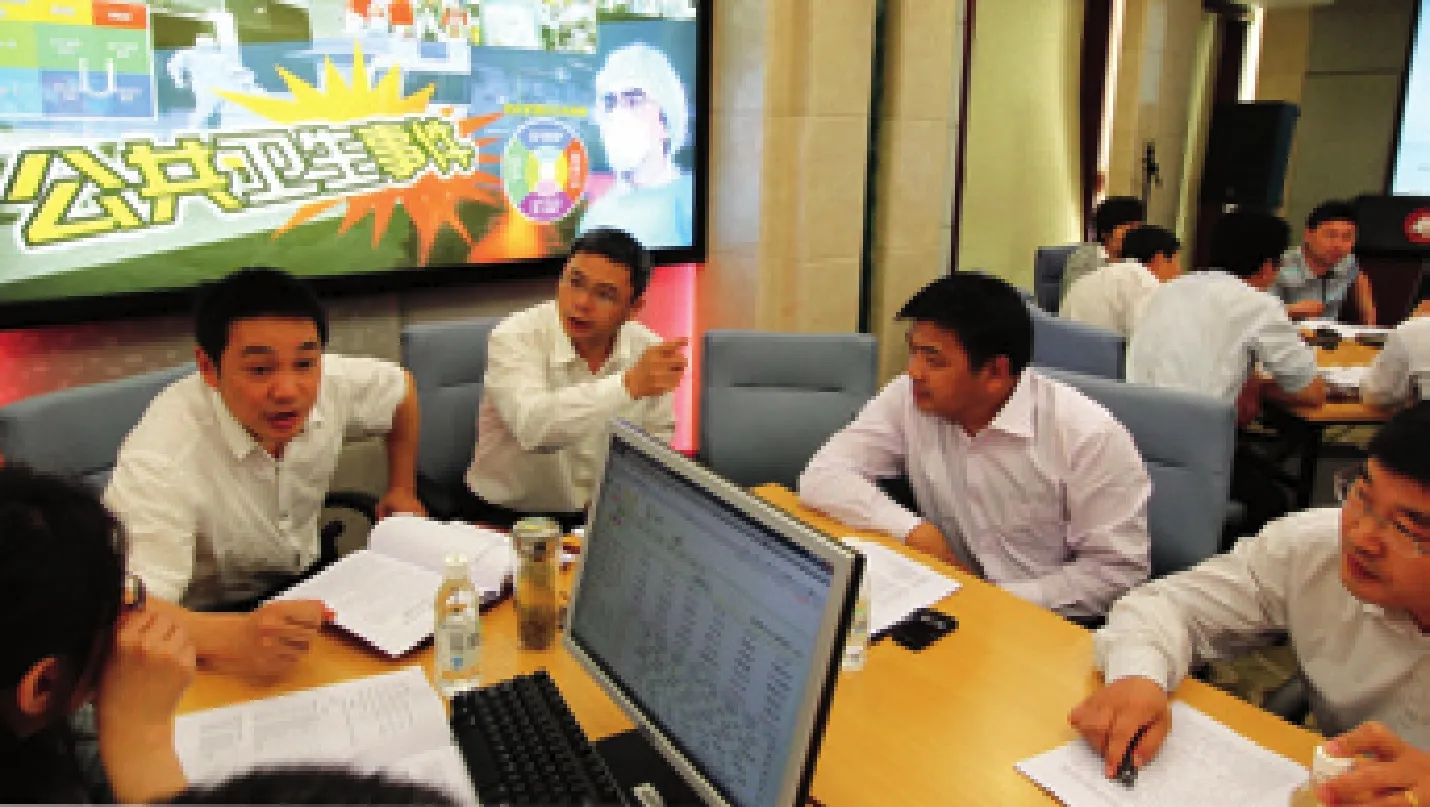Back to Party School
2012-10-14WangHairong
Back to Party School
Cadres attend CPC training facilities to receive further education in the revolutionary tradition, and governing theories and practices By Wang Hairong

REVIEWING HISTORY: Trainees at China Executive Leadership Academ y Jinggangshan visit an exhibition on revolutionary history in Jinggangshan in Jiangxi Province on May 10, 2011
T he Communist Party of China (CPC)has always attached great importance to training cadres.
“A fter the founding of the Peop le’s Republic of China, China was very poor, and wanted to modernize. CPC cadres needed to learn things they did not understand before,”said Yang Jiamu, associate counsel of the cadre Education Bureau under the Organization Department of the Central Comm ittee of the CPC. “Since the implementation of the reform and opening-up policy in the late 1970s,cadres have been confronted w ith new situations and tasks, and they need to continue to study in order to master the modern rules and meet new challenges.”
On December 18, 2002, at a national meeting on the organization work of the CPC,Hu Jintao, General Secretary of CPC Central Committee and President of China, said that all CPC members should “study, study and study again.”
On December 27, 2002, members of the Political Bureau of the 16th Central Comm ittee of the CPC engaged in the first group study. Hu said that group study should be made a routine to stick to for the long term.
As of the end of May 2012, the Political Bureau of the 16th and 17th central committees of the CPC had engaged in 77 sessions of group study, and more than 100 top experts and scholars had taught at Zhongnanhai, the offices of top CPC and government leaders.The courses covered major issues in economics, politics, law, culture, society, international affairs, military and Party construction.
Nowadays, almost all local CPC comm ittees have organized such group studies.“Educating cadres is a pioneering, basic and strategic project to build a high-caliber cadre force, an important way to enhance the CPC’s governing ability, and a major guarantee to push forward scientific development and promote social harmony,” said Yang.
In 2007, the 17th National Congress of the CPC called for a continuation of largescale cadre training.
Yang said that cadre training is important and pressing. He believes China is facing a new international situation and challenges in domestic economic and social development, and the most effective way to address the new situation is to step up cadre training so as to enrich their know ledge and enhance their abilities.
New exp lo rations
The CPC’s cadre training at the national level are primarily delivered by six facilities including the Party School of the CPC Central Committee and the Chinese Academy of Governance in Beijing, three executive leadership academies respectively in Pudong District in Shanghai, Yan’an in Shaanxi Province, and Jinggangshan in Jiangxi Province, and China Business Executives Academy Dalian in Liaoning Province.
Founded in 1933, the Party School of the CPC Central Comm ittee is the Party’s top training institution. Currently, Xi Jinping,Vice President of China and member of the Standing Comm ittee of the Political Bureau of the CPC Central Committee, serves as the school’s president.
Provincial and m inisterial-level officials usually undergo two months of training in political science, public management, econom ics and history. Young and m iddle-aged officials spend six months to a year at the school.
Since 1981, the school has also offered postgraduate and doctoral programs to noncadre students. These programs focus on philosophy, econom ics, law, politics and the history of the CPC.
The three executive leadership academies were established in 2005 in response to a call for large-scale cadre training made after the 16th National Congress of the CPC in 2002.One year later, China Business Executives Academy Dalian was set up.
Each of these training institutions has its own focuses. The two in Beijing specialize in Party construction and governance capability. The institute in Pudong emphasizes innovation in reform, international affairs,human resources management and leadership methods. The academies in Jinggangshan and Yan’an, two revolutionary bases, focus on CPC revolutionary history and the national situation. The academy in Dalian mainly trains business executives in large stateowned enterprises.
Trainees to national CPC training facilities usually come from national Party organs,state-owned enterprises and public organizations. Since the 16th National Congress of the CPC in 2002, business executives have been adm itted into these training facilities.
Cadres at national training facilities are primarily selected by the Organization Department of the CPC Central Comm ittee and provincial and municipal counterparts.
Since last year, central government cadres at or above the rank of department head are required to take a certain number of credit hours of courses, usually 40-60 credit hours per year, at seven designated universities in Beijing including the Party School of the Central Committee of the CPC, the Chinese Academy of Governance, and such prestigious universities as Peking and Tsinghua.Cadres can decide which courses to take in which universities as long as the courses are related to their work and can give them the know ledge they lack.
Over the years, cadre training facilities have adjusted their curriculums and teaching methods to better meet cadres’ needs.
In 2010, the General Office of the Central Committee of the CPC issued the 2010-20 cadre education and training reform outline, which stated that the basic principles of cadre education are to be innovative, practical and result-driven,and oriented toward serving the people.
Fo r in stan ce, the acad em y in Jinggangshan has reformed traditional forcefed pedagogy by adding case studies and an internship-like course called “social practices.” Multimedia technology and the Internet are used in instruction.
Lo ca l o rien tation
In addition to national CPC training academ ies, many local cadre training facilities exist to train cadres at county and township level governments.
National Party schools have recently opened their doors to grassroots cadres.“Local cadres mainly include Party leaders,government officials, and leaders of econom ic entities and social organizations at county,township and village levels,” said Yang.

ROLE PLAYING: County head-level caders from Dafeng, Jiangsu Province, in a scenario sim ulation c lass in China Executive Leadership Academ y Pudong in Shanghai on May 16, 2011. In the c lass, they p lay the roles of m ayor and Party Secretary to hand le cases simu lating real-life scenarios
According to Beijing-basedOutlook Weekly, since October 2008, county Party secretaries have been eligible for training in national facilities. In November 2008, more than 2,000 county Party secretaries were adm itted into national CPC training facilities.
In November 2011, the General Office of the Central Comm ittee of the CPC issued a circular on strengthening and reform ing local cadre education.
Local cadres work on the front lines and are executors of the Party’s policies, and their ability and conduct are important to the overall image of the cadres and the sound development of the Party and the country, said the circular.
According to the document, higher level training facilities are encouraged to recruit local trainees and make quality training resources accessible to local cadres.
Generally, every year, local caders at county and township governments should comp lete at least 100 credit hours, or 12 days of training and other local caders at least 40 credit hours, or five days of training.
W ang Jichuan, Party Sec retary o f Tianjia Village, Nanding Town, Zhangdian District of Zibo in Shandong Province,recently com p leted a training session in the China Executive Leadership Academy Jinggangshan.
Wang and 19 other village cadres from Zhangdian District were the fi rst group of village cadres attending the academy.
“The stability and development of villages have bearing on overall social stability and development. That is why village cadres were sent to the academy,” Sun Jibo, head of the Organization Department of the CPC’s Zhangdian District Comm ittee, toldZibo Daily, a local newspaper.
W ang Yong, Secretary of the CPC Zhangdian District Comm ittee, said that improving the qualification of village cadres is “laying the groundwork” for the district’s future development.
W ang Jichuan felt invigorated by the training at Jinggangshan. “I w as very touched by the unshakable faith of the oldgeneration revolutionaries and their lasting passion,” he said.
